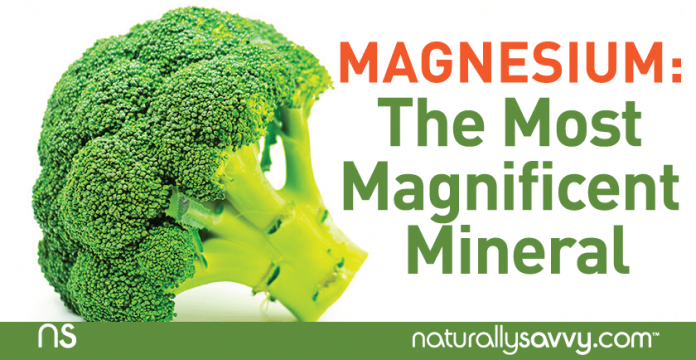
Every day in my practice, I treat patients fighting medical problems that may have been avoided by one mineral. This mineral has become a mainstay in helping my patients. One mineral typically devoid in our diets, yet so critical to proper to living happy, healthy lives. Imagine patients paying hundreds, thousands of dollars for medical care for advice about the most common, most important, and perhaps most misunderstood, mineral for proper body function: Magnesium.
Billions of dollars go to the satellite industries developed to cater to our health epidemics-producing everything from bestselling diet books to weight loss centers to lines of “heart-healthy” foods-and promising they can prevent or reverse these conditions. For many, it’s like digging for treasure and always coming up empty.
Yet there is something we can do to offset the outrageous expenditures and unnecessary procedures; in fact, this single mineral, magnesium, can help prevent life-threatening health conditions from developing in the first place. The answer is simple, inexpensive, and effective.
Unfortunately, most people – even doctors – overlook magnesium's necessity for developing energy, lowering blood pressure, stopping painful muscle cramps, relieving nagging insomnia and most importantly, decreasing risk of heart disease.
Read more about teas for insomnia
Heart disease is the number one killer in the United States today, accounting for direct and indirect costs of more than $190.3 billion each year, and the American Heart Association forecasts that these costs will increase by a minimum of 200 percent over the next 20 years.
Magnesium is essential to the proper functioning of the body. This master mineral is a necessary ingredient for approximately 350 enzyme systems, thus playing a role in the majority of your body’s metabolic processes.
Simply put: without magnesium, life as we know it would not exist.
Yet despite magnesium’s importance, an estimated 80 percent of all Americans unknowingly suffer from chronic magnesium deficiency and that may be a conservative estimate. This is worrisome, as magnesium deficiency is a significant factor in heart disease, obesity, type 2 diabetes, emotional disorders, metabolic syndrome, osteoporosis, muscle cramps, fatigue, depression, migraines, insomnia and certain cancers (breast, colon, and prostate).
Read more about other nutrients for preventing heart disease
Without an adequate supply of magnesium, your body cannot properly produce blood, transform energy, transmit nerve impulses, maintain the integrity of its musculoskeletal system, or regulate and maintain healthy acid-alkaline balance (pH) in the blood, cells, and tissues.
Common signs of magnesium deficiency
- Fatigue
- Muscle cramps
- Numbness and tingling
- Bowel dysfunction
- Palpitations
- Headache
- Weakness
- Loss of appetite
- Nausea and vomiting
- Insomnia
- Stress (both causes and exacerbates magnesium deficiency)
Unfortunately, our miraculous bodies cannot produce minerals on its own. Therefore, it is crucial that you obtain an optimal supply of magnesium each and every day.
How can we increase our magnesium levels?
Magnesium is found in leafy green vegetables
It’s also in broccoli, squash, pumpkin, peas, okra, avocado, flax and dried pumpkin seeds, seaweed, basil, almond butter, unsweetened cocoa powder, coriander leaf (cilantro). I recommend organic foods or foods grown in local farms and gardens which have soils that have not been depleted of magnesium.
Eat more raw vegetables
Research shows that most people suffer from some level of impaired digestion due to various factors ranging from enzyme deficiencies, lack of sufficient stomach acid, insufficient diversity of healthy gut flora, food allergies, and other gastrointestinal conditions. These factors further diminish your body’s ability to completely absorb and use the magnesium and other nutrients it obtains from the foods you eat. One of the most common mistakes people make is to overcook their food. Even a few minutes of lightly steaming vegetables can reduce the magnesium content of vegetables, while other cooking methods, such as boiling and roasting, can destroy magnesium content altogether. For these reasons, it’s a good idea to eat at least a portion of your vegetables uncooked.
However, even with the best of intentions, a diet seemingly rich in nutrients is simply not sufficient for getting your daily dose of magnesium. This is not to say that you should give up on eating healthy foods-far from it! You should continue to give your body a fighting chance by supplying it with a well-balanced diet of organic, non-processed foods.
[Editor's Note: Pure Essence Ionic Fizz ™ Magnesium is our favorite ways to supplement magnesium when we aren't getting enough magnesium from our food.]











